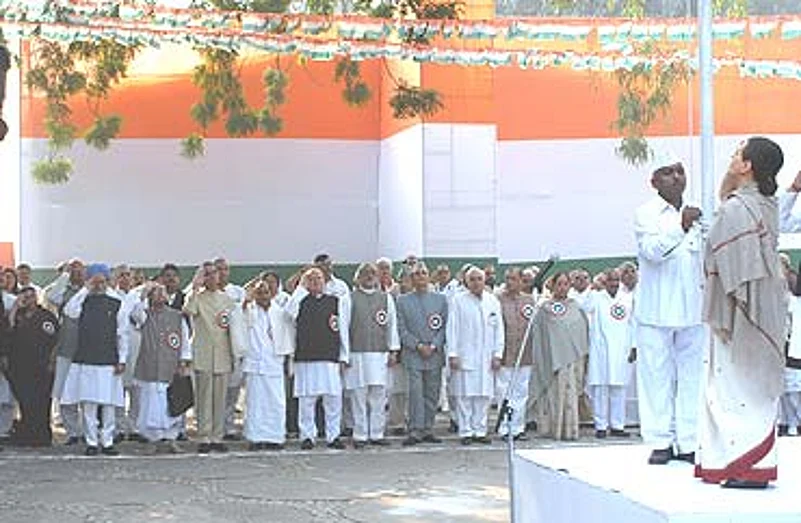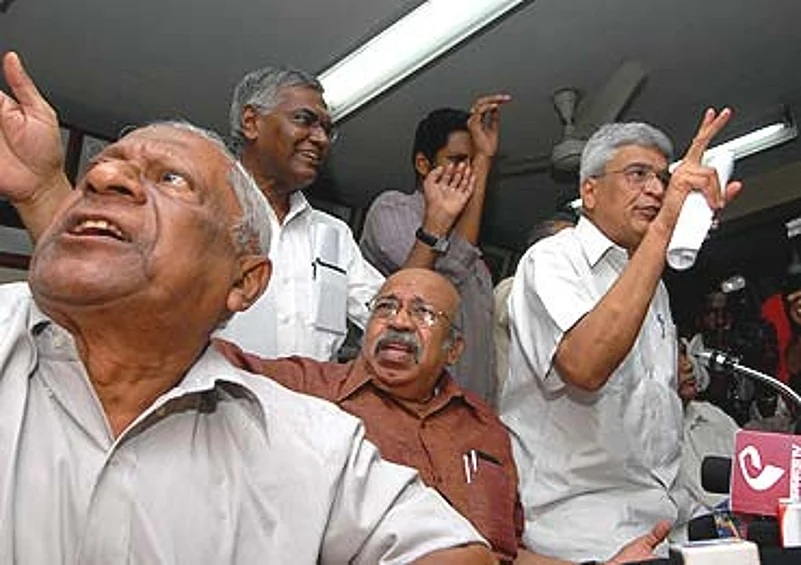"By nationalism I mean the habit of assuming that human beings can be classified like insects... that whole blocks of people can be confidently labelled good or bad."
—George Orwell, 1945

Certainly, empathy for the poor was a defining feature of the national movement. Which is certainly lost to us today. In fact, in a strange twist of fate, nationalism has now gone global for the rich and aspirational middle classes. Rama Bijapurkar, market analyst and author of We Are Like That Only, says that "today it's more about where we stand in the world. Nationalism is not so much about what we do within our own borders". For those belonging to the boom sectors it's easy to be proud of a country that is doing well. The flip side of this is the NRIs who develop a particularly cloying brand of hyper-nationalism towards a nation they left behind. What does make the NRI dilemma more acute is the economic strides India has taken since the '90s. All the goodies the NRI uncle once brought are now easily available in India. The "phoren returned" relative is no longer a central figure to the family in India.
In India itself, the mindset is changing. Prof (Dr) Nimesh G. Desai, head, department of psychiatry at the Institute of Human Behaviour and Allied Sciences, Delhi, sees three distinct phases in the evolution of Indian nationalism. Post-independence, there was a collective attempt at institution-building; the '70s and '80s were a period of uncertainty when India appeared to be struggling and doubts were emerging about national pride. "But from the '90s onwards," he says, "Indian nationalism has emerged in a form that is very akin to American nationalism." His main point is that individual enterprise is now celebrated as opposed to collectivism. "If along the way the nation benefits, so be it," he says. In other words, we want to be part of a great nation but we don't want to face any personal inconveniences. As long as we are doing well, we believe all is well in our country.
But is it? An IT industry or the many huge malls can't be the culmination of Indian endeavour. What of the political rot, falling standards in public life, the vexed question of whether the ruling Congress or any other party today upholds any national values. Clearly, the grand old party is not what it was at the time of independence. The ideal of serving a nation has been replaced by lip service to a family. M. Anandkrishnan, ex-chairman of the Madras Institute of Development Studies, is scathing about the political rot: "The Congress has stooped so low to conquer. There is a political disintegration of all major parties creating a lot of chaos."
In the midst of all this churning there is the BJP, posing as the "only and true" protector of national interest. Journalist and right-wing ideologue Swapan Dasgupta says every political party has a vocabulary of its own. The rhetoric of leaders like L.K. Advani and Narendra Modi too is replete with imagery of the Indian nation. In the party and Sangh parivar tradition, Bharat Mata imagery and patriotic songs rich in Hindu symbolism are the 'warm-up' at public rallies.

Country instincts? And on the left, Karat and co
So is the Hindu Right then the inheritor of the nationalist mantle today? Dasgupta believes it could have been if the BJP's political growth had been matched by any real religious evolution or growth in Hindu society. "I do not think the BJP has lived up to the potential it showed in the early '90s, largely because of this failure," he says. The BJP, he argues, would have been a real force if it had been able to build a Hindu coalition like the Christian coalition in the US. True, the vhp tried to tap the mandirs and pilgrimages. But the real growth in Hindu society post-'90s took place among the evangelical gurus/TV gurus. "The great irony," says Dasgupta, "is that they are Hindus but they all claim to be universalists. There was Baba Ramdev but he claims to be a yoga teacher!" Dasgupta believes the BJP could have tapped such evangelical forces and taken the Hindu movement to another level.
But such blueprints for growth do not always materialise in what is a complex society. Dasgupta and his fellow travellers can draw comfort though the saffron party does have it in them to play up the hyper-jingoism or patriotism bit. Prof Desai says that "if you make a point from an extreme position, it gives you the latitude to be jingoistic. A centrist position does not". He also argues that the BJP's strength lies in the basic human need to belong to social identity groups. "The psychological dilemma for the Congress will always be greater as it is difficult to whip up emotions if you come from a neutral egalitarian position," he says. But if the BJP has stolen the march in mouthing jargon, it is only because the Congress has made its task easier. Besides the big two, the nation's political destiny lies in a multitude of small parties who speak the language of caste and region as opposed to nation.
In the political matrix that now makes up India, no one party or individual can claim to carry the national colours. There is a thread here, a design there, a fine webbed pattern on the border. There is purity, clarity, mixed with sleaze and slush. The tragedy of great poverty in great numbers. And the global dream of those who carry their Indian passports with pride as they fly in and out of international airports. They are the winners of the Indian game, "masters of the universe", a breed of new-age global conquerors like the ones American author Tom Wolfe describes in his '90s classic The Bonfire of the Vanities. Even as many of us endure and survive, they appear to be living this dream that is now being sold to India.
























